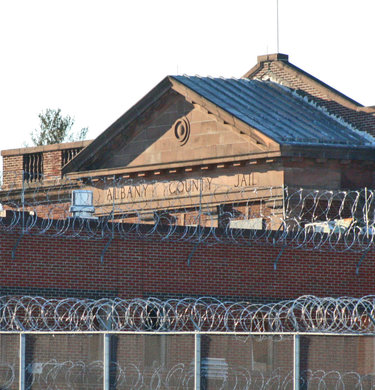Suit alleges: Young New York City prisoners are ‘tortured’ in Albany County jail
ALBANY COUNTY — A suit brought by four young men, transferred from jail on Rikers Island in New York City to Albany County’s jail while awaiting trial, alleges they were routinely assaulted, including sexual assault, by prison officers upon their arrival and that they were then forced to live in solitary confinement for months on end.
Kim DeSantis, secretary for Albany County Sheriff Craig Apple, responded to calls to the sheriff this week from The Enterprise, saying, “He can’t talk because it’s in litigation. He would love to talk about it if he could.”
Apple started working for the department in 1987 as a corrections officer. Since becoming sheriff in 2011, he has implemented progressive programs including out-of-jail work details, a wing for veterans that has cut recidivism, a prison garden, inmates training unadoptable dogs, the Sheriff’s Heroin Addiction Recovery Program, and legal services for immigrants detained in the jail.
The 101-page suit describes in detail the experiences of each of the four plaintiffs:
— Davon Washington, 19, an African American living in the Bronx who was released from custody on Dec. 24;
— Steven Espinal, 19, a Latino still in solitary confinement in the jail;
— “John Doe,” 24, a Latino from the Bronx; and
— Pariis Tillery, 25, an African American still in solitary confinement in the jail.
It also briefly describes the trials allegedly suffered by two other young men, one of them still in the Albany County jail.
The descriptions are strikingly similar. The young men, none of them convicted of a crime, are taken from Rikers without explanation, with no means of notifying their lawyers or families, and are put in a van with no windows and driven for about three hours to Albany without being told where they are going, according to the complaint.
When they arrive, a dozen or so guards in green fatigues, known as the Green Team, put them in cages and “deliver commands that are bizarrely detailed and confusing,” such as, “Take off your shirt with your right hand and pass it backward over your left shoulder,” the suit claims.
When the disoriented young men get it wrong, they are punched and kicked, the complaint alleges. The guards say they are hiding contraband in their bodies. When they deny it, they are beaten some more. Some are shot with tasers between beatings.
“Guards insert their fingers and batons into the young men’s rectums … The young men lie naked on the floor, crying, pleading, covered in their own urine and feces,” the suit alleges. “There are no rules, no procedures, and no laws in this place. The young men are far from their families, far from their lawyers, cut off from the outside world. They fear that they could be killed at any moment and no one would know what happened to them.”
The suit, filed on Dec. 28 in United States District Court in Manhattan, first reported on by The New York Times that same day, says, “It is about the City’s policy of knowingly sending these young men to Albany to be tortured; it is about Albany County’s policy of torturing them; and it is about the correction officers who carry out the torture.”
So the defendants are the city of New York and workers in its Department of Corrections as well as Albany County and many of its employees and officers including Sheriff Craig Apple, jail Superintendent Michael Lyons, Lieutenant Anthony Torrisi, Lieutenant Mark Valvo, Sergeant Dan Poole, Sergeant Michael Grimes, and jail nurse Melissa Mylroie.
The suit, which demands a trial by jury, is based largely on the Fourteenth Amendment of the United States Constitution and seeks several declarations that the Constitution has been violated as well as several injunctions to protect the plaintiffs still in Albany County’s jail.
“We, the People, have decided through our Constitution that not even the most despised detainees may be tortured. Not even someone who has assaulted a correction officer. Not even an alleged gang member. Not even someone who is hiding contraband in his body,” the suit says. “We are a society of laws, and due process — the idea that sets us apart from repressive regimes worldwide — forbids this.”
It was filed by Katherine Rosenfeld and Douglas E. Lieb of Emery Celli Brinckerhoff & Abady in Manhattan, and by Steven Goldman of Goldman & Associates in the Bronx.
Solitary confinement
Four years ago, the suit notes, the federal Department of Justice issued a report on conditions at Rikers that stated the city improperly relied on solitary confinement as a tool to manage adolescent detainees, “expos[ing] them to risk of serious harm” and raising serious constitutional concerns. The report said that disruptive and unstable detainees became more disruptive and unstable when they were put in solitary confinement, isolated from social support and necessary services, and given little incentive to improve behavior.
The suit notes “growing societal recognition of the harm of solitary confinement, particularly for young people” and cites the American Psychiatric Association’s stance that solitary confinement is associated with increased risk of self-mutilation and suicidal ideation, greater anxiety, depression and paranoia, and that the risks are particularly acute for young people.
The suit notes that in January 2015, the New York City Board of Correction adopted a regulation banning solitary confinement (or “punitive segregation”) for detainees age 21 and younger in New York City. Regulations passed by the board also limit the time detainees over age 21 can spend in solitary confinement. For instance, an adult detainee cannot spend more than 30 consecutive days in solitary unless he has been sentenced for a serious assault on correctional staff, which has a maximum of 60 days.
A New York Times investigation in July found the transfer of young inmates increased sharply in 2015, the year the city adopted the ban on solitary confinement. In response, the suit notes, Mayor de Blasio endorsed and ratified New York City’s practice. “Occasionally we have to remove a prisoner from our correction system because there is an immediate threat to them and something that requires them being moved to another jurisdiction,” he said.
After an initial assault on arriving in Albany County, Rikers detainees, the suit claims, “spend their remaining time at the Albany County Jail in solitary confinement,” each one in a cell that is typically 6 by 8 feet.
“They are in their cells by themselves for a minimum of 23 hours a day, with no meaningful social interaction, environmental stimulation, or human contact,” the suit says; they are offered one hour of “recreation” by themselves in an indoor cage, which most decline “because the cage is functionally indistinguishable from their cells.”
Circumventing city ban, says suit
The suit also explains that New York State law allows for the transfer of pretrial detainees between jails in different counties through a procedure known as a “substitute jail order,” or SJO, which is issued by the state’s Commission of Correction.
Substitute jail orders are to be issued only under specified conditions, such as a natural disaster making a jail unfit to hold detainees, or “when the safety or security of a [detainee] or group of [detainees] is threatened by their confinement in a facility and the facility administrator reasonably believes that the public interest, as well as the safety of the [detainees], would be better served by their being housed in another … facility.”
Options within the same county are to be used first. Notice to the detainee is required, the suit says, quoting from the law: “The administrator of the receiving jail ‘shall provide [the detainee] immediately with a written notification of the reasons for his transfer.’ The transferred detainee ‘shall be entitled to all the rights and privileges available to other [detainees] of the receiving facility.”
The original jurisdiction pays the receiving jurisdiction’s expenses of holding the detainees, which the suit terms “a lucrative business for upstate county jails with excess capacity. In 2013, housing other counties’ detainees on SJOs brought Albany County more than $3 million in revenue.”
The suit also says that Albany County charges New York City $175 per day for each city detainee it houses at its jail.
The suit maintains that New York City sends “detainees whom it deems undesirable” to upstate jails “to circumvent its own ban on solitary confinement for detainees 21 and younger.”
“Custom of torturing Rikers detainees”
The suit says that Lieutenant Anthony Torrisi, who commands the “Green Team” routinely tells detainees, “This isn’t Rikers. We do what we want here.” Torrisi could not be reached for comment.
It also says Torrisi orders detainees to be beaten and routinely claims to have seen contraband in the rectums of Rikers detainees.
“Jails have legitimate security needs and must prevent detainees from bringing contraband or weapons inside,” the suit says. “If a search identifies contraband in a detainee’s body, the appropriate responses may include placing the detainee in isolation and waiting until the detainee expels the contraband or seeking the assistance of a medical professional to remove the item with the detainee’s consent.
“It is unreasonable, unsafe, and inconsistent with standard correctional practice for a guard who has no medical training to attempt to forcibly remove contraband from a detainee’s rectum without his consent in a nonmedical environment.”
The suit alleges, “Green Team officers sometimes use Tasers against cuffed Rikers detainees, insert their fingers into detainees’ rectums; and even sodomize detainees with foreign objects. These actions have no legitimate security purpose. Rather, they are assasults designed to assert the dominance of correctional staff and humiliate, intimidate, and degrade detainees.”
Further, the suit alleges, the assigned medical provider, Nurse Mylroie, “refuses to give detainees medical care, unhelpfully telling them that they are fine as long as they can walk and talk, and instructs them to take Motrin.”
The suit contains samples of prison write-ups, usually saying Rikers detainees assaulted staff, while hospital medical records tell a different story.
After the arriving Rikers detainees are assaulted, the suit claims, they “are given a disciplinary hearing at which they are told it does not matter what they say because they will be found guilty regardless.”
The suit alleges that New York City “has received repeated notice of Albany’s torture and abuse,” has “failed to investigate or remediate these conditions and has continued sending detainees, including many aged 21 and younger, to the Albany County Jail without notice, to be beaten and put in solitary confinement.”
The suit further alleges that, although state law governing jails requires that “all prisoners shall have access to legal counsel,” including telephone communications … that shall not be monitored except visually,” there is “no such thing as a confidential, unrecorded legal telephone call to or from the Albany County Jail.”
Judgment
The suit lists 31 causes of action, most centered on the Fourteenth Amendment, many involving denial of rights and due process, and some on the Fourth Amendment regarding unreasonable search and seizure. The suit seeks compensatory and punitive damages to be determined at trial, reasonable attorneys’ fees and costs, and several declarations:
— That New York City’s custom of transferring young pretrial detainees outside the city to evade the ban on solitary confinement or to punish or retaliate against the detainees violates the United States Constitution;
— That Albany County’s custom of torturing pretrial detainees transferred from New York City on arrival at the county jail violates the United States Constitution; and
— That the city’s custom of transferring pretrial detainees to Albany County’s jail with the knowledge and expectation they will be subject to excessive and unlawful force violates the United States Constitution.
Finally the suit seeks three injunctions:
— Ordering the defendants to cease holding Espinal and Tillery in solitary confinement, returning them to a jail in New York City;
— Prohibiting the defendants from retaliating against Espinal, Tillery, or Doe; and
— Requiring Albany County, Apple, and Lyons to make unrecorded, unmonitored legal telephone calls available as necessary to Espinal and Tillery.



